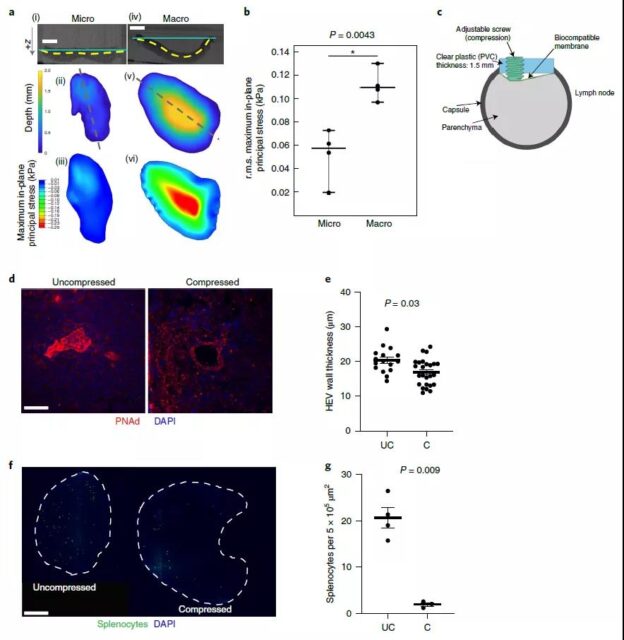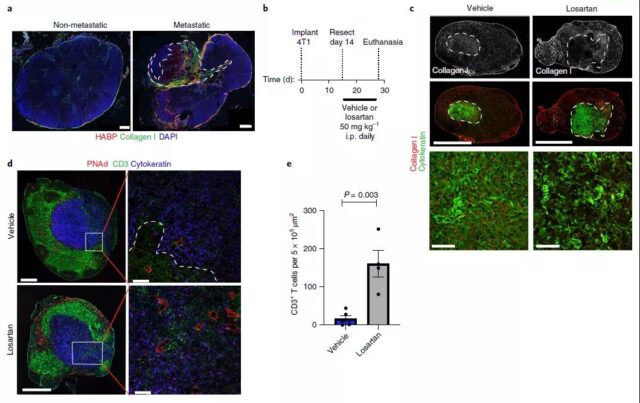Antihypertensive drugs are expected to assist in the treatment of cancer
- Why Botulinum Toxin Reigns as One of the Deadliest Poisons?
- FDA Approves Pfizer’s One-Time Gene Therapy for Hemophilia B: $3.5 Million per Dose
- Aspirin: Study Finds Greater Benefits for These Colorectal Cancer Patients
- Cancer Can Occur Without Genetic Mutations?
- Statins Lower Blood Lipids: How Long is a Course?
- Warning: Smartwatch Blood Sugar Measurement Deemed Dangerous
Nature Sub-Journal: Antihypertensive drugs are expected to assist in the treatment of cancer and prevent cancer cells in the lymph nodes from escaping
Antihypertensive drugs are expected to assist in the treatment of cancer. Lymph nodes are essential for the body’s immune response to fight tumors, but paradoxically, cancer cells that have spread or metastasized to lymph nodes can often be prevented from being eliminated by immune cells. What are the specific reasons behind this immune escape phenomenon? Can provide new methods for cancer treatment?
Recently, researchers from Massachusetts General Hospital of Harvard Medical School and Boston University School of Medicine published a research paper titled: Solid stress impairs lymphocyte infiltration into lymph-node metastases in the sub-Journal Nature Biomedical Engineering.
By understanding how cancer cells render lymph nodes ineffective, we hope to help lymph nodes produce an anti-cancer immune response, which will help fight cancer cells everywhere in the body.

With the development of cancer, lymph nodes are often the first place where cancer invades. Our immune system can attack and kill cancer cells. But how do the lymph nodes of the organ that produce the immune response allow cancer cells to survive and accept them instead of attacking them?
By analyzing tissues from breast cancer, colon cancer, and head and neck cancer patients, combined with animal models of breast cancer lymph node metastasis, the research team found that immune cell T cells are very abundant in metastatic lymph nodes, but they cannot penetrate and spread to such lymph nodes. Tumor tissue. The research team measured the increased physical force in the lymph nodes of metastatic cancer, known as Solid stress.
The research team hypothesized that the solid stress in lymph node tumors would impair blood flow and the T cell transport capacity of lymph node vessels. The research team then developed a device that compresses lymph nodes to simulate the gradual growth of lymph node metastases. When they exert pressure on the lymph nodes, there is a clear connection between the physical force and the blockade that destroys the entry of T cells into the lymph nodes.

These studies have shown that as cancer cells grow in the lymph nodes, they will reorganize and change the lymph nodes, rendering key functions of the immune system ineffective. By understanding how cancer cells make the lymph nodes function ineffective, it can help the lymph nodes produce an anti-cancer immune response, and also help fight cancer cells everywhere in the body.
In addition, the research team also found that using the antihypertensive drug losartan to relieve solid stress can promote blood flow and the number of T cells in lymph node metastasis, indicating that relieving solid stress is a potential strategy for improving T cell entry into tumors.

The research team said that this study raises many new and important questions, such as whether losartan combined with immunotherapy will cause metastatic cancer cells in the lymph nodes to be killed by T cells and be eradicated? In addition, will this lead to a powerful systemic anti-cancer immune response, thereby helping to eliminate cancer from the entire body? Finding the answers to these questions may lead to new treatment strategies for patients with metastatic cancer.
(source:internet, reference only)
Disclaimer of medicaltrend.org
Important Note: The information provided is for informational purposes only and should not be considered as medical advice.



